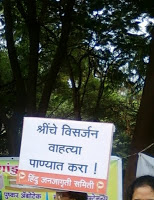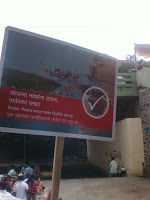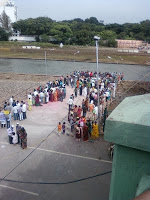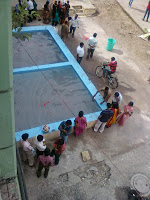Any newspaper, TV channel that we currently turn to is in an reporting -overdrive about Anna Hazare’s fast and the youth ‘involvement’ that is sweeping the country. I am not qualified to comment about the Jan Lokpal or its government version. However as an ordinary citizen I have faced situations that demanded ‘Laxmi darshan’ or similar to expedite any work I may have.
Let me elaborate.
The commonest one that each one of us probably is guilty of is ‘making deals with God’ when our wish is fulfilled. This may mean a visit to the particular place of worship, offerings (in the form of cash in the hundi/coconut etc), lighting candles/offering a ‘chadar’, some people walk (for several kilometers) to the temple and so on. The offerings vary subject to the ‘size’ of the wish granted and deep pockets of the recipient!
We had offered a pooja at small temple (the residing deity was claimed to fulfill devotees wishes) outside our base in Assam when we finally received our luggage after two months. The truck was delayed and its owner simply could not trace it. It had all our earthy possessions and their loss would have set us back by a princely sum. Besides spending huge amounts on STD (this was way before the current telecom revolution) we really could not do anything. More about that another time..
Coming back to my point, what are we to consider such offerings as? Or is this to be excused as its not made to a living person?
We often pay a few hundred rupees at government offices to ‘hasten’ our work. Pay a couple of hundred to avoid the ‘test’ prior to a learning (driving) license, add a few blue/green/ red notes to the designated amount to ‘facilitate’ easy registration of property, avoid paying a fine when driving through a red signal and so on… We justify these as saying that the agent makes some money and we are actually helping provide a livelihood to someone. Sounds a bit far fetched but yes, I have heard these arguments.
Come election day (either for state or central or local level) many people (this includes those other than in the ‘youth’ category) take off for a weekend break or holiday and do not vote. ‘What difference does it make?’, ‘Will my vote make any difference?’ are some reasons to justify this flight from exercising their duty. Some claim that we need electoral reforms. When a particular doctor’s treatment fails to provide relief to our complaints, we change the doctor. Politically, voting is one way to make a change.
Anna’s fast has driven India’s youth and middle class away from their AC offices/ homes furnished with newly gained affluence onto the street to raise a voice against the corruption menace. I hope it forces them to think and think hard about corruption. I would like to see this ‘josh’ sustained into the future, much after the current matter is resolved.
The new law (in whatever form) will work on larger issues but what about our daily lives. Are we ready to make sacrifices, face hardships just so we don’t pay anything under the table? Are we ready to pay the fine for our vehicle not having a valid PUC certificate? Are we ready to stand in queues for a domicile certificate and ready for it being rejected?
My apprehensions about corruption were totally unjustified when we re-entered civil life after our stint in the Services. We could get whatever licenses, agreements we needed without greasing any palms. Of course it meant repeated trips, standing in queues but we received our documents before our Patience snapped. That experience only restored my faith in the system.
Those following global developments will agree that foreign and western ‘rich’ nations face corruption as well (it may take different forms). While many readily point accusatory fingers at India and our systems, its for us, to repair any faults. If we don’t do so, who will?
Its when each one of us (ok let me not be ambitious- lets keep that most of us) vows not to grease palms, not to use money to expedite our work that Anna’s agitation will have long lasting meaning and make a fundamental change in our though processes.
Does this sound too simplistic? Probably yes. But small wins will add up to huge gains. Else it will be like having beautiful house thats being eaten up from inside by white ants. Or a lovely attractive physical body being eaten up by diabetes and heart disease.
Before I end, this is a good time to recap the inspiring timeless ad by Times of India:
Jai Hind!




